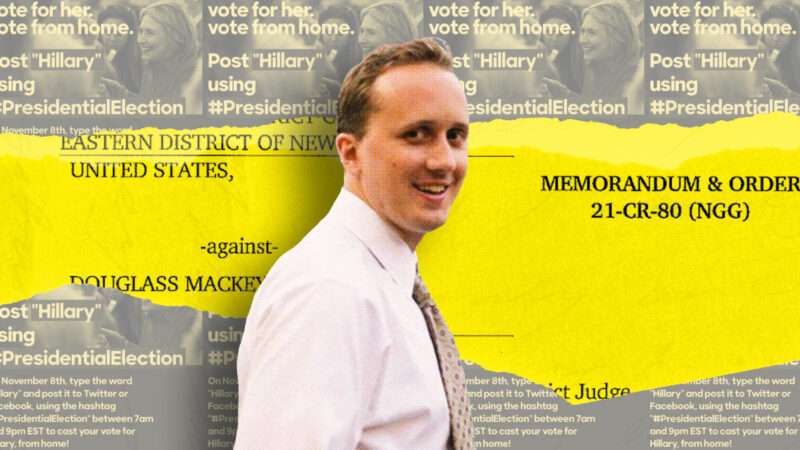
In a first-of-its-kind case, the Justice Department is prosecuting an internet troll, using a Reconstruction-era law to claim that a series of misleading social media memes were an attempt to "deprive individuals of their constitutional right to vote."
During the 2016 election season, Douglass Mackey was a prolific far-right Twitter user under the name "Ricky Vaughn." Mackey frequently posted pro-Trump memes and commentary to his 58,000 followers. One MIT Media Lab analysis has claimed that he may have had a larger effect on the 2016 election than NBC News.
At one point he posted a series of images that seemed geared to trick Hillary Clinton supporters into thinking that they could vote by text. "Avoid the line. Vote from home," one of these images reads against a Clinton-branded background. "Text 'Hillary' to 59925." According to a Justice Department press release, at least 4,900 people texted the number before Election Day.
Federal officials say this was a deliberate attempt to violate voters' constitutional rights. On January 27, 2021, they charged Mackey with conspiracy "to injure, oppress, threaten and intimidate one or more persons in the free exercise and enjoyment of a right and privilege secured to them by the Constitution and laws of the United States, to wit: the right to vote." Their case rests on an 1870 law designed to prevent violent white supremacist mobs from preventing black citizens from voting. The Justice Department believes this is the first time an American has faced criminal charges for Twitter disinformation.
Mackey tried to get the case thrown out in district court last month, arguing that his tweets were satiric and First Amendment–protected. His motion to dismiss was denied. Judge Nicholas G. Garaufis wrote, "This case is about conspiracy and injury, not speech….As applied within the Indictment, this law is used to prosecute a conspiracy to trick people into staying home from the polls—conduct effectuated through speech—not a crime particular to the utterances made to effect that aim."
Aaron Terr, an attorney at the Foundation for Individual Rights and Expression, disagrees. "The First Amendment presumptively protects all speech unless it falls into a specific, narrowly defined category established by the Supreme Court. And the First Amendment doesn't make a general exemption for false speech," he says."There are certain types of false speech that are established exceptions to the First Amendment, such as defamation or fraud," but Mackey's speech clearly doesn't fall into either category.
Eugene Volokh, a professor at UCLA School of Law, suggested in a recent Tablet article that "narrow and clearly defined statutes that prohibit lies about the mechanics of how to vote are likely constitutional," but he also noted that "there is no such clear and narrow federal statute" in Mackey's case. He added that when similar issues have appeared in court, judges have generally been "quite skeptical about general bans on lies in elections."
If Mackey is convicted, it would pave the way for direct government regulation of a broad category of speech labeled as election "disinformation." The consequences could be far-reaching—possibly causing a range of anti-voting speech to be subject to criminal prosecution.
"I think you can reasonably ask what would [the Justice Department's interpretation of the law] apply to something like somebody simply discouraging people from voting?" Terr added. "I mean, there are serious scholars and commentators who have argued that your vote doesn't matter. What if that causes a large number of citizens to sit on Election Day? Is that harming the election process? Is that harming democracy?…It's just dangerous to grant the government that that type of authority."
The post Can the Feds Prosecute Douglass Mackey for His Twitter Trolling? appeared first on Reason.com.







